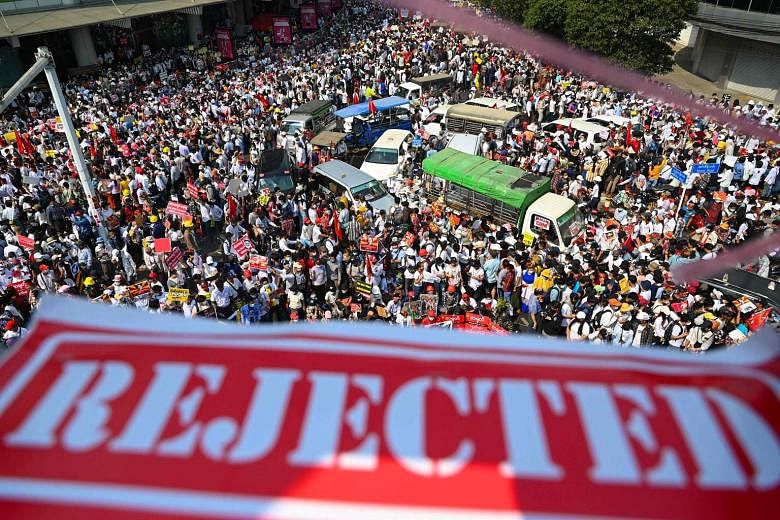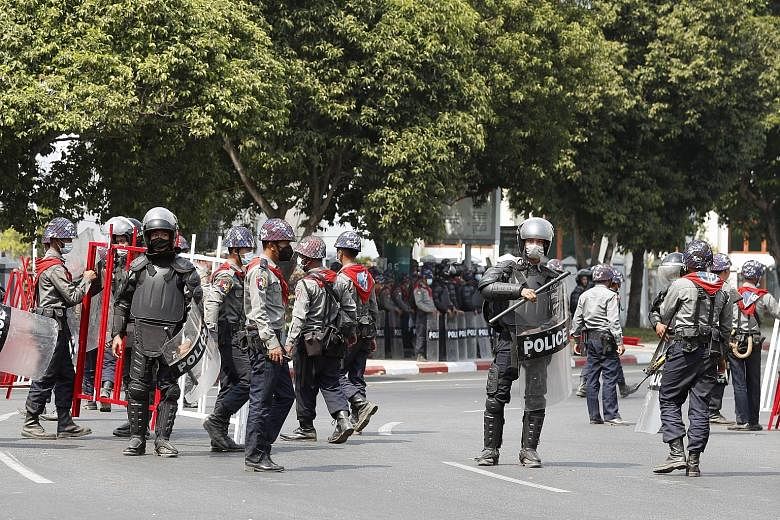YANGON • Tens of thousands of anti-coup protesters rallied across Myanmar again yesterday despite a clear threat from the junta that it was prepared to use lethal force to crush what it branded as "anarchy".
The warning came after three demonstrators were shot dead over the weekend, and the funeral on Sunday for a young woman who died from bullet wounds at an earlier rally.
Massive street demonstrations have taken place since Myanmar's military staged a coup on Feb 1 and detained civilian leader Aung San Suu Kyi, ending a decade-long experiment with democracy.
A civil disobedience campaign has also since choked many government operations, as well as businesses and banks, and the junta late on Sunday gave its most ominous signal yet that its patience was nearing an end.
"Protesters are now inciting the people, especially emotional teenagers and youths, to a confrontation path where they will suffer the loss of life," said a statement on state-run broadcaster MRTV.
The statement, read out in the Myanmar language with text of the English version on the screen, cautioned protesters against inciting "riot and anarchy".
Protesters yesterday were undeterred by the warning and gathered in the streets in cities and towns across the country, from the northern hills on the border with China to the central plains, to the Irrawaddy river delta and the southern tip of the panhandle, social media images showed.
"We came out today to join in the protest, to fight until we win," said 23-year-old university student Kyaw Kyaw. "We are worried about the crackdown, but we will move forward. We are so angry."
In a country where dates are seen as auspicious, protesters noted the significance of the date Feb 22, 2021, comparing it with demonstrations on Aug 8, 1988, when a previous generation staged anti-military protests that were bloodily suppressed.
But that and the government warning did not put people off. "We need to come out," said 46-year-old San San Maw, at a main rallying point in Yangon.
Yangon residents had woken up yesterday to a heavier security presence, including police and military trucks on the roads and an embassy district barricaded.
"The military unjustly took power from the elected civilian government," said a 29-year-old, who asked not to be named. "We will fight until we get our freedom, democracy and justice."
Many businesses in Yangon and in other major cities were shut yesterday following calls for a general strike to inject more momentum into the civil disobedience movement.
United States Secretary of State Antony Blinken said on Twitter that the United States would continue to "take firm action" against the authorities violently cracking down on opponents of the coup.
Britain, Germany and Japan have condemned the violence and United Nations Secretary-General Antonio Guterres urged the military to stop repression.
The generals put up with years of sanctions after crushing the 1988 protests and are likely to shrug off pressure again.
The army seized power after alleging fraud in the Nov 8 elections in which Ms Suu Kyi's party trounced a pro-military party. The Election Commission dismissed the fraud complaints.
Myanmar's Assistance Association for Political Prisoners said 640 people have been arrested, charged or sentenced since the coup - including former members of government and opponents of the coup. The generals had already responded to the uprising by gradually ratcheting up the use of force.
Troops and police have used rubber bullets, tear gas, water cannon and some live rounds.
Over the weekend, two people were killed when security forces fired at protesters in the city of Mandalay, and a third man was shot dead in Yangon. A young woman also died last Friday after being shot in the head at a protest and spending almost a fortnight on life support.
The woman, whose funeral was held on Sunday, was the first confirmed fatality of the protests, and she has emerged as a potent symbol of the anti-junta movement.
The junta has severely curbed Internet access overnight for eight straight days, according to the monitoring group NetBlocks.
Myanmar's Foreign Ministry on Sunday justified its use of force against protesters, and accused the UN and foreign governments of "flagrant interference" in the country's internal affairs.
"Despite facing the unlawful demonstrations, incitements of unrest and violence, the authorities concerned are exercising utmost restraint through minimum use of force to address the disturbances," it said in a statement.
AGENCE FRANCE-PRESSE, REUTERS


